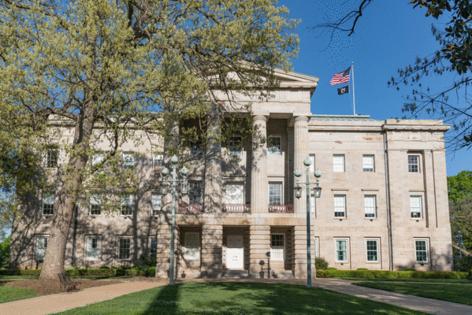No North Carolina budget deal yet among Republicans, as Democratic lawmakers call for action
Published in News & Features
RALEIGH, N.C. — North Carolina’s state budget continues to be delayed, now two months into the new fiscal year, as top Republicans have failed to reach a deal.
Thousands of teachers and school personnel across the state began the school year on Monday, with uncertainty about when and if raises are coming. The legislature sets the base pay for teachers, with some gaining additional pay from local governments.
Here’s what you should know about where things stand with raises and the broader overall budget.
Democrats ready for legislative action, but Republicans haven’t reached a deal
Democratic lawmakers spoke to reporters in a mostly empty Legislative Building on Wednesday, saying they are ready to work but are waiting on the Republicans who control how and when legislation moves. Republicans have a supermajority in the Senate and are one vote away from total control in the House.
“We need to come back into session,” Senate Democratic Leader Sydney Batch of Wake County said, adding that Democratic lawmakers are ready to work. Lawmakers were told last week that the scheduled sessions this week would be procedural only.
“It is a sad, tragic reality that we now have a state that is willing to shutter their doors and to turn their backs on North Carolinians, because Republicans refuse to do their job,” Batch said.
A spokesperson for the Republican House speaker dismissed Batch’s criticism.
“Senate Democrats and their fearmongering are entirely irrelevant to this process,” Demi Dowdy, spokesperson for House Speaker Destin Hall, told The News & Observer.
“House Republicans will not rush the budget process at the expense of our state employees, teachers, and other needs of the state,” she said.
Step-increase raises were approved
The reason for the budget delay is a stalemate between Republican leaders of the House and Senate. The main reason has been a disagreement on future tax cut triggers. Senate leader Phil Berger does not want to change the triggers set in place in 2023, which will lower future income-tax rates if left unchanged, while Hall wants the triggers to be adjusted.
Lawmakers passed a compromise mini budget bill in July that Democratic Gov. Josh Stein signed into law in August that included step-increase raises for teachers and state employees who are on those raise plans.
Step-increase raises must be signed off by the General Assembly, and are tied to years of service. The legislature usually also gives overall raises to state employees and teachers, and the amount is often negotiated in a final comprehensive budget bill. If a deal is reached and a bill becomes law, raises would be retroactive to July 1, when the fiscal year began.
Unlike the federal government, North Carolina state government does not shut down without a budget; spending levels remain at the same amount as the previous budget cycle.
Lauren Horsch, spokesperson for Senate President Pro Tem Phil Berger, said the mini budget bill that recently passed “included millions of dollars to address immediate needs like enrollment growth in our public schools and salary step increases.”
House Democrats voted with House Republicans on budget proposal
House Democratic Leader Robert Reives was among a majority of Democrats who voted for the Republican-written House budget, which is rare. At the time, Democrats said they supported Republicans’ plan for raises and adjusting future tax cut triggers.
Reives said it’s hard to explain to state employees and teachers why the budget is so often late, and why there’s so much uncertainty about raises.
“These people have chosen to do this; state employees have chosen to sacrifice what they can make in the private sector to come make this state a better place. And every year they’re up here fighting, trying to find out if they can get a raise,” Reives said.
Stein talked about the lack of a full budget when he visited a Raleigh elementary school on Monday, as students returned for the first day of the school year, The N&O previously reported.
“There are not meaningful pay raises for our teachers. We have some of the lowest paid teachers in the country. That is an embarrassment, and it is unacceptable,” Stein said.
Where budget talks stand
The General Assembly will have another procedural, no-vote session on Thursday. After that, lawmakers will not return until the last week in September.
Budget talks are now at the highest levels, between Hall and Berger. If they reach a deal, a final version of the budget will come out and be up for a vote.
Berger wants to stick to the current tax triggers Republicans agreed to in the 2023 budget negotiations.
“We do not make it a practice to negotiate via the press,” Horsch said about current budget negotiations. “However, the Senate has provided the House with multiple budget proposals, including keeping the current tax package — as approved by both the House and Senate in 2023 — in order to move budget discussions forward. Senate budget writers remain open to negotiating a comprehensive budget bill.”
©2025 The News & Observer. Visit at newsobserver.com. Distributed at Tribune Content Agency, LLC.







Comments